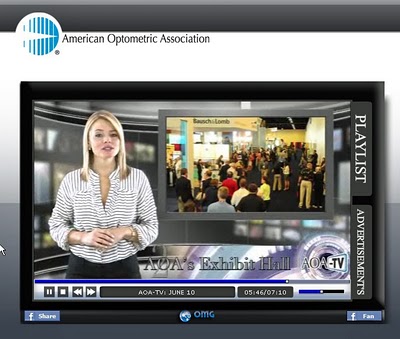Comments: Dr. Mike Cohen and I have been friends for years. He is a builder of bridges between various optometric communities....and like MainosMemos a great believer in getting the word out about what's new in the area of eye and vision care. He authors the
OD2OD Newsletter (The latest one can be found here http://www.od2od.com/Later_June_2010_Newsletter.php)and always gives great information about the latest in eyecare, the best recipes, and the latest good books and articles. You can email Mike at
[email protected] and ask him to start your subscription to OD2OD today! He was kind enough to feature me as the OD2OD June's Issue Doctor of Note...here's what he said: DM
DOCTOR OF NOTE: Dr. Dominick Maino is a Professor of Pediatrics/Binocular Vision at the Illinois Eye Institute/Illinois College of Optometry and is in private practice in Harwood Heights, IL. He received his MEd at the University of Illinois Chicago and Bachelor's degree from Beloit College.
Dr. Maino is the past Director of the Institute for Advanced Competency Post-Graduate Continuing Education Program, an Adjunct Professor of Pediatrics/Binocular Vision at the Centro Boston de Optometria in Madrid Spain, and the Director of the Developmental Disabilities Service at the Neumann Association. He is a Fellow of both the American Academy of Optometry and the College of Optometrists in Vision Development, and holds membership in the American & Illinois Optometric Associations, and the Neuro-Optometric Rehabilitation Association.
Dr. Maino has received recognition for his work from the Neuro-Optometric Rehabilitation Association, College of Optometrists in Vision Development, Optometric Editors Association, and the Easter Seal Society of Metropolitan Chicago. He is an internationally recognized expert on oculo-visual problems of children and adults with disabilities. His research interests include special populations, pediatrics, and binocular vision dysfunction.
Dr. Maino's avocations include website design, blogging, music (tenor/trumpet) and photography. His blog can be accessed at http://www.MainosMemos.blogspot.com .
He is currently a spokesman for the American Optometric Association on the 3D Vision Syndrome. This is where individuals suffer symptoms associated with the new technology of 3D movies, TV and video games.
I’m delighted and honored to call Dom a personal friend.



